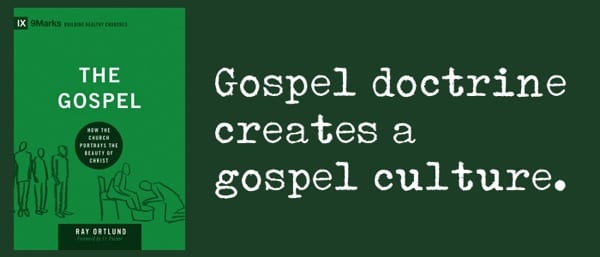
The Gospel: How the church portrays the beauty of Christ is written by Ray Ortlund. He is the pastor of Immanuel Church in Nashville, Tennessee, and wrote this book to be included in the 9Marks series “Building Healthy Churches”. He is the author of several other books and serves as the president of Renewal Ministries. He also serves on the councils of The Gospel Coalition and the Acts 29 Network.
This book has been an insightful read for me. The main point of The Gospel is the principle that gospel doctrine creates gospel culture. If a church does not have a biblical view of the gospel, it will not have a gospel culture, and therefore won’t be healthy. Thus, the gospel relates to the church and is foundational for the church. The church must always rely on the gospel.
Summary
The book has been divided into seven chapters. At the beginning of each chapter, the author uses a different verse of scripture to lay the ground for his argument. His main goal is not to define and expound the gospel; rather it is to show how it should work itself out in the Church. In the first three chapters the author defines the Gospel as;
“God, through the perfect life, atoning death, and bodily resurrection of Jesus Christ, rescues all his people from the wrath of God into peace with God, with the promise of the full restoration of his created order forever- all to the praise of the glory of his grace (p16)”,
and explains how the good news of Jesus Christ relates or applies, first to us personally, second, to the church, and lastly, to all creation. I find it helpful that the definition of the gospel ensures that all readers are on the same page for the discussion that follows in the book. The final four chapters discuss the difficulty of creating healthy gospel cultures and the culture developed by the gospel.
Ortlund argues that when the doctrine is clear and the culture is beautiful, that church will be powerful. But there are no shortcuts to getting there. Without the doctrine, the culture will be weak. Without the culture, the doctrine will seem pointless (Pg.21). On page 23, he further illustrates how the gospel culture or gospel-centered church looks like using the equation below which sums up the whole book I think:
Gospel doctrine-gospel culture=hypocrisy
Gospel culture-gospel doctrine=fragility
Gospel doctrine+ gospel culture=power
He emphasizes that only the powerful presence of the risen Lord can make a church this gospel-centered.
Content Reflection
This book helps show how the gospel relates to the church and everything. It is a good starting place for discussion on why it is important for our churches to teach the clear gospel doctrine and what the resulting culture should look like. In chapter 6, the author talks about the joy with which people receive the gospel and how with much bitterness others reject it. It is helpful for us to be reminded that the power is not in our ability to attract and convince people, but rather the power is in God who softens people’s hearts to receive the message, as we consider our role in proclaiming the gospel.
I found this book to be clear and easy to read. It has given me a guide in what the community centered on the gospel should look like. I like that the author proves all his arguments using the bible with scripture references which were used appropriately and were consistent with their meaning, cultural examples, and many past voices. He is careful to show you that he is not making these things up, this is what the bible teaches and what Christians have taught for years. It ends with a challenge, when the gospel is truly preached, people will either respond with joy or take offense, and we are to persevere despite the negative response from church members this requires; Power, Courage, and Love.
Recommendation
This is a challenging, hope-filling, and convicting book on the topic of the gospel culture that should be produced in churches by gospel preaching. I recommend this book to every Christian involved in their local church as they consider how gospel doctrine should influence gospel culture, and that they should continually hold fast, and rejoice in their salvation in Jesus Christ.
Review written by Tracy Ndlovu.